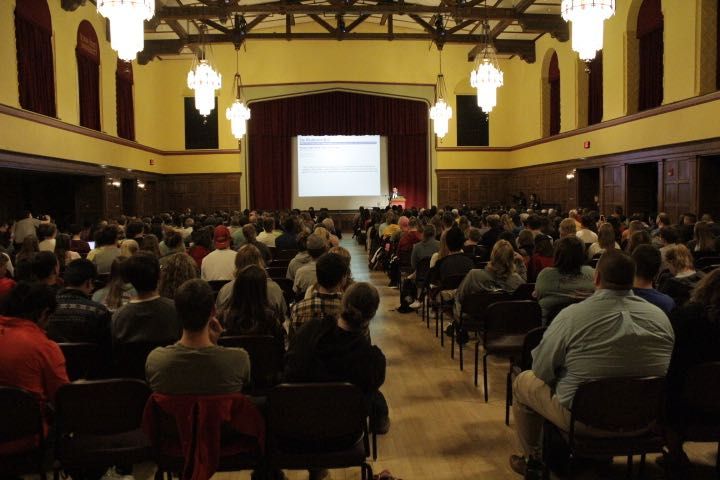Journalist and activist lectures on immigration and identity
October 20, 2015
How do you define ‘American’?
To Jose Antonio Vargas and some students at Iowa State, the answer is a lot simpler than American laws say.
“My life and our lives are worth more than pieces of paper,” Vargas said at Tuesday’s lecture in the Memorial Union.
A Pulitzer Prize-winning journalist, Vargas has written for several news organizations, including The Huffington Post and The Washington Post, and worked as an immigration rights activist. He also appeared on the cover of TIME magazine and has testified in front of a Senate committee regarding immigration reform.
Vargas won accolades across the country, from the Salem Award from the Salem Award Foundation to an honorary Doctor of Letters from Colby College.
“I decided that I was done hiding from you and hiding from my government,” Vargas said.
Born in the Philippines, Vargas was sent to the U.S. to live with his grandparents when he was 12 and has lived and worked here since. He came out as an undocumented immigrant four years ago in an article written for The New York Times Sunday Magazine.
For students on Iowa State’s campus, he serves as a role model – both for themselves and for the campus as a whole.
Iowa State has an international and minority population on campus with more than 8,300 international or minority students enrolled, according to the Registrar’s Office.
Despite this, the campus isn’t always welcoming.
“People are definitely tense about it,” said David Ortiz, a senior in environmental science.
This tension erupted earlier this semester at the Cy-Hawk football game and at a following diversity forum. However, students reported much subtler problems in their day-to-day lives.
Ethnic or racial jokes can be extremely hurtful whether they are intended to be or not, said Rachel Ramirez, a junior in graphic design and vice president of marketing for Sigma Lambda Gamma National Sorority. These offhand comments may seem harmless, but some students feel they contribute to a negative environment for minority students.
“People just assume and then say really insensitive things,” Ramirez said.
For both Ramirez and Ortiz, the Greek community has offered a safe haven.
“It really provided the proper environment for me to excel,” Ortiz said.
Ramirez shared the sentiment by saying that Sigma Lambda Gamma National Sorority offered her a comfortable space to embrace her identity.
Some students, like Ortiz, think a safe space shouldn’t be limited to a fraternity or sorority, though. He believes that there should be more multicultural events on campus to encourage dialogue throughout the student body.
“I think, when you see more of these events happening, they show Iowa State who multicultural students are,” Ortiz said.
These events provide an opportunity for students to engage other students on campus in the dialogue on race and ethnicity in America.
“We must insist on difficult, uncomfortable, necessary conversations,” Vargas said.
Tuesday’s lecture focused primarily on addressing immigration and racial identity issues in America. Vargas emphasized the necessity of breaking out of traditional conversations and involving people across demographics.
He also highlighted the intersectionality of immigration and race issues.
“I can’t stand here and talk to you about immigrant rights and not talk about Black Lives matter and LGBTQ rights and women’s rights,” Vargas said.
Attendees seemed to appreciate his honesty. Teresa Aguilar, a graduate student in education, Greisy Murillo, a freshman in kinesiology and health, and Esperanza Pintor, a program coordinator in the school of education, were three members of the audience on Tuesday.
The three said they were grateful for the chance to hear Vargas and echoed Ortiz in hoping for more events to encourage dialogue on diversity and immigration in America.
“It’s good,” Pintor said. “It’s good to realize that we’re here.”

















